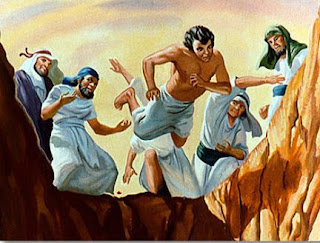The Scripture readings for this blog can be found at Friday of the Fifth Week of Lent | USCCB
As we get closer to Holy Week and the Passion and
Death of Jesus on Good Friday, we hear in today’s gospel how the Jews were
still having problems accepting and believing that Jesus is indeed the Son of
God, the Messiah. A few verses earlier in this 10th chapter of St.
John, the Jews ask Jesus, “If you are the Messiah, tell us plainly.” All
throughout the gospel of St. John, Jesus was very clear and plain about being
the Messiah, the Son of the Living God.
But the Jews were having a hard time wrapping their
mind around the fact that Jesus was not only Messiah, but also God. They truly
thought Jesus was blaspheming. As a result, they were ready to stone him to
death. They said, “We are not stoning you for a good work but for blasphemy. You, a man, are making yourself God.”
All throughout the gospels, we hear of the works that
Jesus performed: the healings, the miracles, and then the eventual resurrection
from the dead after being so brutally killed on the cross. We have the grace by
what we read in the gospels to know and believe that Jesus is really indeed the
Messiah, True God and True Man.
The obstacle for the Jews at the time was that they
saw only the physical body of Jesus and were unable to look beyond his body to
see that Jesus was also true God. He showed them through the works that he did
that he was indeed the Messiah and God, but they allowed their minds to be
blocked by the fact that they only saw Jesus, the Man.
If there are times when we ourselves have doubts that
Jesus is indeed true God and true man let us move beyond these doubts and ask
the Lord for the gift of faith to know Jesus Christ as he truly is: Messiah and
God. Let us pray to Jesus, “Lord, we believe, help our unbelief.”





